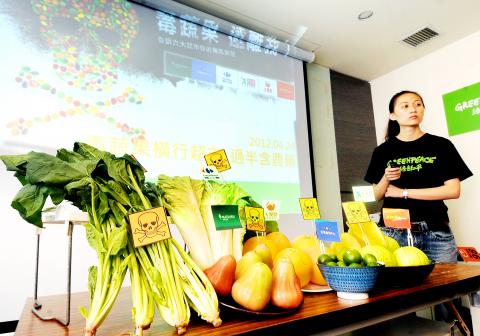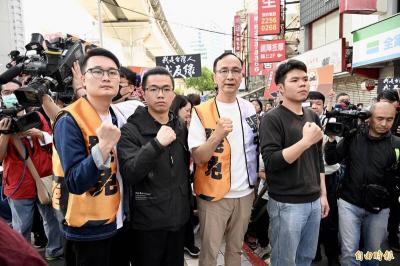A second round of tests on fruit and vegetables sold at six of the nation’s main supermarkets and wholesale chains showed that hazardous pesticide residues were found on 20 of the 36 products tested, Greenpeace Taiwan said yesterday.
The organization released its first report on pesticides in February, in which it revealed that 74 percent of fruit and vegetables examined in December contained 36 types of pesticide residue, with one fruit product containing residues of nine types of pesticide.
This time the survey found residues of a pesticide with reproduction toxicity — carbendazim, which may cause harm to fetuses — on items from all six of the chains surveyed, the organization said in its report.

Photo: Fang Pin-chao, Taipei Times
It added that procymidone, azoxystrobin and dimethomorph, which can cause infertility, were found on items from one of the wholesale chains.
Greenpeace Taiwan’s agriculture project manager Tsai Szu-ting (蔡絲婷) said eight of the fruit products tested contained more than three types of pesticide residues, with oranges sold at Pxmart wholesalers containing eight types, kumquats sold at Matsusei supermarkets containing six types and strawberries sold at Pxmart wholesalers containing five types of residue.
Moreover, among the eight types of pesticide found in oranges, flucythrinate and carbofuran were considered as highly hazardous by the WHO, Tsai said.
The US Environmental Protection Agency has in 2009 banned carbofuran residues on food sold in the US.
“The organization has communicated with the supermarkets after announcing the first report in Feburary, but the stores only chose to pull the problem items off the shelves, without taking other positive actions to change the situation and they cannot protect consumers from health problems,” Tsai said.
Although the doses of pesticide residues found on the samples were not high, the organization is concerned about the combination effect — which it compared to mixing cocktails — of several pesticides on human health, Tsai said.
A mixture of several pesticides could be even more hazardous than only a single type of toxic agent, Tsai said.
The organization said pulling the tainted products off the shelves was not a responsible solution to resolve the problem, and urged supermarkets and wholesale stores to promise to consumers that they would enforce a strict ban on pesticides listed as highly hazardous by the Council of Agriculture, as extremely hazardous and highly hazardous by the WHO, and also pesticides affecting reproduction or causing damage to bees’ pollination abilities.
Greenpeace Taiwan also suggested establishing tracing systems for fresh food products, to monitor and control the safety of foodstuffs for consumers.

The Ministry of Economic Affairs has fined Taobao NT$1.2 million (US$36,900) for advertisements that exceeded its approved business scope and ordered the Chinese e-commerce platform to make corrections in the first half of this year or its license would be revoked. Lawmakers have called for stricter supervision of Chinese e-commerce platforms and more stringent measures to prevent China from laundering its goods through Taiwan as US President Donald Trump’s administration cracks down on origin laundering. The legislature’s Finance Committee yesterday met to discuss policies to prevent China from dumping goods in Taiwan, inviting government agencies to report on the matter. Democratic Progressive Party

Taiwan and its Pacific ally Tuvalu on Tuesday signed two accords aimed at facilitating bilateral cooperation on labor affairs, according to Taiwan’s Ministry of Foreign Affairs (MOFA). The governments inked two agreements in Taipei, witnessed by Foreign Minister Lin Chia-lung (林佳龍) and visiting Deputy Tuvaluan Prime Minister Panapasi Nelesone, MOFA said in a news release. According to MOFA, the agreements will facilitate cooperation on labor issues and allow the two sides to mutually recognize seafarers’ certificates and related training. Taiwan would also continue to collaborate with Tuvalu across various fields to promote economic prosperity as well as the well-being of their

The Taipei District Prosecutors’ Office has continued its investigation into allegations of forged signatures in recall efforts today by searching the Chinese Nationalist Party’s (KMT) city chapter and questioning several personnel including the chapter director, according to media reports. Among those questioned and detained were KMT Taipei chapter director Huang Lu Chin-ju (黃呂錦茹), chapter secretary-general Chu Wen-ching (初文卿), chapter secretary Yao Fu-wen (姚富文) and first district committee executive director Tseng Fan-chuan (曾繁川). Prosecutors said they would not confirm reports about who had been summoned. The investigation centers on allegations that the ongoing recall campaigns targeting Democratic Progressive Party legislators Rosalia Wu (吳思瑤)

Several Chinese Nationalist Party (KMT) officials including Chairman Eric Chu (朱立倫) are to be summoned for questioning and then transferred to prosecutors for holding an illegal assembly in Taipei last night, the Taipei Police said today. Chu and two others hosted an illegal assembly and are to be requested to explain their actions, the Taipei City Police Department's Zhongzheng (中正) First Precinct said, referring to a protest held after Huang Lu Chin-ju (黃呂錦茹), KMT Taipei's chapter director, and several other KMT staffers were questioned for alleged signature forgery in recall petitions against Democratic Progressive Party (DPP) legislators. Taipei prosecutors had filed